New Report – “Who Owns the UK Media?”
The Media Reform Coalition (MRC) has published a new edition of its flagship Who Owns the UK Media? report. This is their fifth study on media ownership in the United Kingdom, which covers data for the period starting with March 2021. According to MRC, the report highlights the dangerous levels of concentrated ownership across the UK’s national and local press, in TV and radio broadcasting, streaming services, and online platforms.

A free, independent, and plural media is essential to the functioning of a healthy democracy says the MRC, but their findings show that the UK media is dominated by a tiny handful of corporate media moguls and ‘Big Tech’ tycoons. Across the newspapers, TV channels, radio stations, and online platforms, these companies hold a dangerous level of power to dictate the national conversation and influence the political agenda to favour their own interests.
An example of media dictating their own agenda was seen in the U.S. Sinclair Broadcast Group, which is the nation’s largest owner of local television stations, faced backlash after being caught using their anchors to push their political views in 2018. The funny clip below shows how that sounded put together in a video.
Yes, this is extremely dangerous to our democracy and there is no doubt our media would sound much the same, particularly during and since the covid period.
“Whoever controls the media, controls the consciousness,” was a quote attributed to Jim Morrison, in 1969, but it has been said by others prior to this and arguably far more since 2020.
The Report Findings by the Media Reform Coalition
The MRC which has been fighting for a “democratic and accountable media since 2011” wrote that the “UK’s media industries faced significant challenges due to covid,” but they found that “the relative ‘return to normal’ in public life has not halted or reversed the ongoing collapse in media plurality, news diversity and public interest journalism exposed by the pandemic.” Since their last report, the MRC say that large companies have continued to expand their dominant market positions through mergers and takeovers.
Some Key Findings
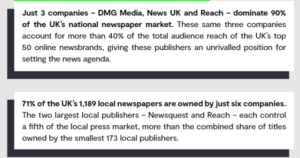
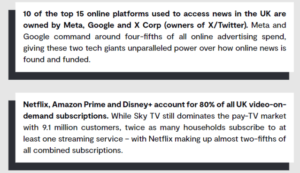
From One Oligarch to Another
In March 2022 Newsquest bought out local publishing rivals Archant, taking control of its 7% market share and cementing Newsquest’s place at the top of a heavily concentrated pack. The forthcoming auction of the Telegraph titles and Spectator magazine risks further reducing the already pitiful diversity of voices in the UK’s national press. With potential bidders including the Daily Mail General Trust and a co-owner of GB News, the sale could merely transfer ownership of these titles from one set of offshore right-wing oligarchs to another.
In telecoms, the owners of Vodafone and Three are seeking a merger to create the UK’s largest mobile phone network, no doubt encouraged by Ofcom’s softened stance on corporate consolidation across the UK media industry.
Local Journalism
Local journalism is in peril, as the collapse of print advertising and persistent job cuts by the largest publishing companies have deprived local communities of news made for and about them. 2.5 million Brits live in areas without a single local newspaper, and across print and online publishing, more and more local titles are being closed or consolidated into generic ‘hub’ websites, producing little to no news in the areas they claim to cover.
Despite the launch of a number of independent and hyper-local outlets, the absence of sustainable funding and support for local public interest journalism means the sector remains shackled to the commercial imperatives of a few apathetic publishing giants.
BBC Remains Dominant
UK broadcasting faces similarly dangerous levels of corporate concentration, cost-cutting and loose commitments to regulatory standards. Although the BBC remains the dominant player across TV and radio, its founding public service mission has been undermined by licence fee freezes, political interference and a questionable strategy to find its digital future.
In entertainment, the BBC is being squeezed out by falling linear audiences and global streaming competitors like Netflix, Amazon and YouTube, and the Corporation continues to cut back its highly valued local and regional radio output. Public trust in the BBC has fallen precipitously in recent years, while the new opinion-led channels GB News and TalkTV regularly exploit Ofcom’s light-touch approach to regulating basic standards of accuracy, impartiality and public interest reporting.
Concentration in Ownership
Surrounding and intensifying this crisis in UK media ownership are powerful and unaccountable global tech giants that own huge swathes of the spaces and technologies we use to fund, find and access media content online. As we detail in an expanded section on online intermediaries, Alphabet (owners of Google and YouTube) and Meta (owners of Facebook, Instagram and WhatsApp) hold almost monolithic control over online advertising, user data, content distribution, and news curation – amounting to an unprecedented concentration of ownership in the online media supply chain.
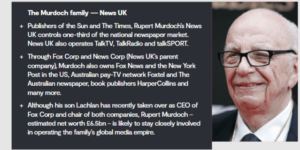
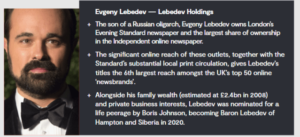
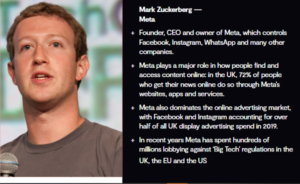
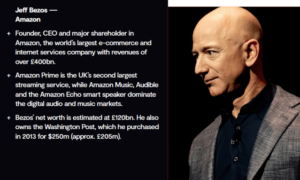
The MRC asks “What does it mean to have ‘free’ media when our newspapers, TV channels, radio stations, social media and streaming services are owned by a handful of giant corporations? Is our media truly independent if the most influential news organisations and online platforms are controlled by billionaires and company boards pursuing their own vested interests? How can we stay informed about pressing issues in our communities when local news sources are being cut, closed or consolidated into online-only outlets with no grounding in the places they report on?”
“The findings in this report, together with our Manifesto for a People’s Media demonstrate the urgent need for reform. Government, regulators and Parliament must act to hold these platforms to account, to protect against further losses in media plurality and diversity, and to create new models for funding, governing and participating in an independent and truly democratic media commons.”
“A free, independent and plural media is essential to the functioning of a healthy democracy. However, these findings show that the UK media is dominated by a tiny handful of corporate media moguls and ‘Big Tech’ tycoons. Across our newspapers, TV channels, radio stations and online platforms, these companies hold a dangerous level of power to dictate our national conversation and influence the political agenda to favour their own interests.”
“We need urgent reform to end the decades of failed regulation and political inaction on concentrated media ownership. Ofcom, Parliament and government must act to break up the dominant media companies, regulate the tech companies that profit off of UK audiences, and create new ownership and funding models to support independent public interest journalism.”
“As an election year looms, which political party will be brave enough to put genuine democratic media reform at the heart of its manifesto?”
Please take a look at the entire report by the Media Reform Coalition where there is much more information.
yogaesoteric
November 11, 2023
